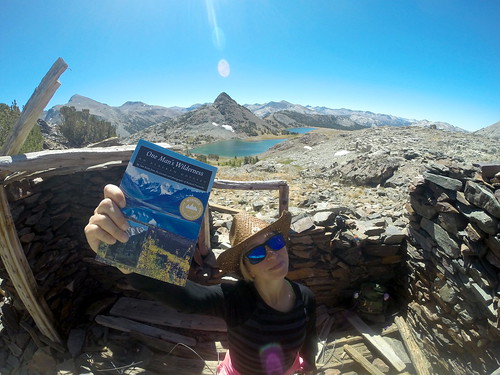
In our current renaissance of homemade and homegrown, One Man’s Wilderness is as in touch with the Zeitgeist as when first published in 1973. At 51, Richard Proennneke arranged to be dropped off in the Alaskan wilderness, alone, with nothing but hand tools and a few supplies. He began building his log cabin on May 22nd and had it complete with moss-topped roof, stone fireplace, and dutch door by the end of September. The book continues through the long winter and following summer until he returns to the Midwest the next autumn to care for his aging father. In the meantime, he builds a cache (an adorable replica of his cabin, but on stilts), makes everything from hinges to dishes with empty gas cans, and attempts to domesticate a wolverine.
I must admit, I was in constant awe of Dick’s skills, strength, and stamina. He seemed capable of building and fixing anything. I had trouble following all the engineering details of even building a simple log cabin. My back ached as he described packing a ram down the mountain in two heavy loads. I shivered in the Yosemite summer evening as I read of his winter outings at negative thirty-four degrees. He makes my summer adventure seem about as daring and complicated as a trip to Disneyland.
I admire Dick, but his experience was so far beyond my own that I didn’t identify with him until one of the last chapters. In the "Reflections" chapter, I found myself nodding in agreement with Dick’s observations on possessions, physical activity, and eating habits. As dissimilar as our actual experiences are, I've come to some of the same conclusions as Dick about modern life.
Possessions: although this book was written forty-three years ago, Dick had already identified Americans’ surplus of “stuff.” He was perfectly content with the $40 of supplies he had flown in and everything he had built with the trees and stones of the land. I’ve been similarly satisfied with the items that fit in my car for the summer. I don’t miss my wardrobe, kitchen, furniture or any of the knickknacks that fill my house. I wonder what Dick would have thought of all the electronic toys that fill our lives, today. I am grateful to have my laptop, phone, DSLR, and GoPro with me, but don’t miss the television one bit. Dick wasn’t a total Luddite; he did bring binoculars, a spotting scope, a tripod, an 8mm movie camera, and a 35mm reflex camera. But who needs all that other crap? Thinking about all my “stuff” at home makes me feel claustrophobic. I have plans to lighten my load when I return and purchase less.
Physical activity: Dick found great satisfaction in the daily physical work of providing for his own shelter, heat, and food. How many of us can say that we built our own houses, chopped our own wood, and grew/hunted/fished our own food? Of course, one of the benefits of modern society is that we don’t have to do these things and, instead, can focus on higher pursuits like science, art, and the general betterment of the human race. But that lack of physical connection to our daily needs leaves us fat and unsatisfied. There’s a balance to be found and Dick’s story has inspired me to outsource less of my own daily maintenance. I am planning to ride my bicycle more and maybe even grow some food.
Eating habits: Dick’s diet was pretty much the same every day. It consisted of oatmeal, beans, fish, game, and sourdough pancakes or biscuits. For variety, he had blueberries, cranberries, fireweed greens, and the odd vegetable he grew in his garden. It was a limited diet, but he didn’t mind. He just “season[ed] simple food with hunger.” I’ve been hiking an average of nine miles a day and, even with that level of activity, I inwardly groan when I’m confronted with the fourth dinner in a row of gnocchi with pesto and vegan sausage. We modern people have been conditioned to expect variety and excitement with every meal. But maybe we need to view food as fuel instead of entertainment. Again, there’s a balance to be had between monotony and complaining that you just had Mexican food for lunch yesterday.
One Man’s Wilderness is aspirational, but it’s inspirational, too. The actual events of his Alaskan adventure are nothing I feel I’ll ever be able to replicate (I won’t be field dressing a mountain sheep - EVER), but the lessons learned are applicable to anyone’s life.
Keith, S. and Proenneke, R. (1973). One Man’s Wilderness. Anchorage, AK: Alaska Northwest Pub. Co.
3 comments:
Reading this reminds me of re-reading the Little House series as an adult. I loved the pioneer stories as a child, but as an adult I had such an appreciation of the hardships of living off the land and making everything one owned. The books have fascinating details of survival in the Big Woods of Wisconsin or prairie life or traveling west by wagon. (And have no resemblance to the awful TV series.)
I've also been thinking about paring down my possessions. I think that urge sometimes happens once people hit a certain age and when they start losing loved ones to illness, etc. I recently lost my mother to cancer, but I was already thinking of getting rid of a lot of my belongings. Tricky when one owns a house that needs maintaining. What I need is less space to fill, clean and maintain.
"The Life Changing Magic of Tidying Up" - must read. :)
Post a Comment